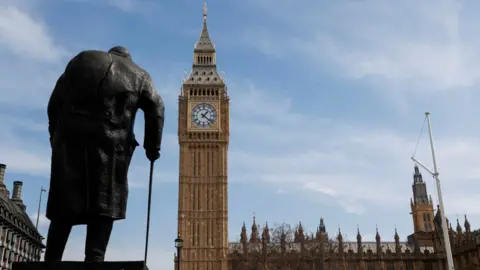In a significant move to protect national monuments, the UK government has decided to criminalize any acts of climbing the statue of Winston Churchill located in Parliament Square. This decision is aimed at preserving the dignity and respect owed to monuments that commemorate influential figures in British history, particularly Churchill, known for his pivotal role during World War II.
The proposed amendment, which will be formally announced today, outlines that individuals caught climbing on the statue could face a penalty of up to three months in prison alongside a hefty fine of £1,000. Although the Churchill statue is not currently classified as an official war memorial, Home Secretary Yvette Cooper intends to add it to a growing list of protected monuments soon to be integrated into law. This measure is part of the broader Crime and Policing Bill that is currently under review in Parliament.
Churchill’s statue is not alone in this new form of protection. Other notable monuments that are to be included under these new regulations are the Cenotaph in Whitehall, the Royal Artillery Memorial in Hyde Park, and various other notable sites across the UK that are dedicated to honoring the service of British armed forces during both the First and Second World Wars.
During the announcement, Cooper emphasized the importance of respecting such historical symbols, stating, “As the country comes together to celebrate VE Day, it is only right that we ensure Winston Churchill’s statue is treated with the respect it deserves, along with the other sacred war memorials around our country.” This comment highlights the government’s intention to foster unity and reverence, particularly as the nation commemorates important historical events.
Interestingly, Winston Churchill himself had a hand in selecting the location of his statue. When plans were laid out for the redevelopment of Parliament Square in the 1950s, Churchill personally chose the spot where he wanted his likeness to be erected. The statue was eventually unveiled in November 1973 by his widow, Clementine Churchill, and was attended by dignitaries including Queen Elizabeth II and the Queen Mother.
The proposal to criminalize climbing on the Churchill statue has garnered support from various political figures, including Prime Minister Sir Keir Starmer. He praised Churchill as one of the UK’s greatest heroes and expressed concern over the growing instances of disrespect shown towards the statue. Starmer stated, “The justifiable fury that is provoked when people use his statue as a platform for their protests speaks to the deep and enduring love that all decent British people have for Sir Winston.” His remarks show a commitment to preserving the legacy of Churchill and honoring the sacrifices made by previous generations during tumultuous times.
The Churchill statue has unfortunately become a focal point for protests in recent years, with demonstrators using it as a platform for various causes. High-profile incidents include a 2014 protest where an activist spent 48 hours on the statue’s plinth and was later acquitted, as well as episodes of vandalism where the statue was defaced with paint and graffiti during rallies such as those held by Extinction Rebellion and Black Lives Matter. These acts have spurred discussions within the government regarding the need for enhanced protections.
The recent actions of trans rights activists who climbed the Churchill statue in April to protest a landmark Supreme Court ruling have further underscored the contentious atmosphere surrounding public monuments. Such incidents have acted as catalysts for the government’s firm stance on ensuring that iconic figures like Churchill are venerated and that occurrences of disrespect, especially during public demonstrations, no longer go unchecked. It remains to be seen how these new laws will impact public discourse and the management of public spaces across the UK.



